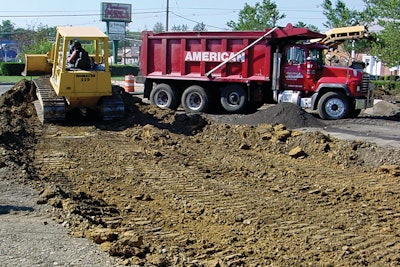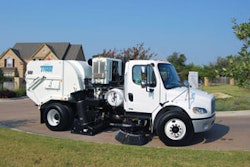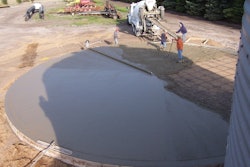
American Asphalt Company has been in business for over a century, seeing significant changes and growth during its 106 years serving customers. Bob Brown, president and owner since 1986, has actively pursued growth and succeeded in transforming a small business with fewer than 10 employees to a company now employing over 100 people with $30 million in yearly sales.
American Asphalt Company, W. Collingswood Heights, NJ, is a paving contractor and hot mix asphalt producer. Brown says 60% of sales comes from the paving division while the other 40% comes from selling asphalt mix. The company services central and southern New Jersey as well as southeast Pennsylvania. Homebuilders, commercial developers, general contractors, and local municipalities make up the workload, Brown says.
Having no experience in the asphalt business at the time he purchased the company, Brown utilized the company's existing employees to gain necessary knowledge of the industry. "I asked the staff that was here to show me what they did and why they did it," Brown says. "They taught me how to operate the asphalt plant, repair the equipment, and work on paving jobs.
Keys to successful longevity
"Honesty, integrity, and treating people with respect are the values I hold and have instilled in our workforce," Brown says. These values are consistently reinforced and communicated to the employees. "In any business, communication is almost always the root of most business problems," Brown says.
To foster communication and reinforce the company's values, American Asphalt Company publishes employee newsletters and holds regular meetings at every level of employment. An internal Web page serves as a daily bulletin board which is constantly updated with important information. But personal communication is also essential.
"We have constant communication between the layers of the company so everybody knows what they are challenged with and they have the information they need to make good decisions," Brown says. "Out in the field each crew has a kick-off meeting everyday, our scheduling team has a daily meeting, and our estimating department meets weekly, and so on."
A more tangible key to longevity is quality employees, and most contractors know that good employees can be hard to find. Brown has been actively seeking talented employees since day one. Finding quality employees was the first step he took after purchasing American Asphalt Company.
"In the very beginning it was finding a foreman that I could trust to run a job so I didn't have to be on site all the time," Brown says. "I looked for anyone that I felt had talent and had the similar core values I did. It's a never-ending quest, and as good people come in - bringing with them new talent - doors to other areas of growth open," Brown adds.
A major factor for any company's success is customers. Without customers a company can't grow. Brown has also always emphasized customer service. "Our mission statement is to provide our customers with the best quality products, at the best price, on time, and with the best overall service." American Asphalt Company makes every effort to communicate to customers it's service-focused both in and out of the office.
Knowing where and how to grow
"Once you have a business it just makes sense to increase your volume so you can operate efficiently," Brown says. In the beginning of Brown's tenure, American Asphalt Company had a very low volume of work - not even enough to keep employees busy every day. So increasing volume was one of Brown's first initiatives after purchasing the company.
To meet the immediate challenge of increasing the volume of work Brown actively marketed himself and his company to potential customers. To introduce himself and prove he and American Asphalt Company were a viable option in the industry, he often had face-to-face meetings with customers. "Networking was a key to increasing sales volume and is always a key to managing and growing a business," Brown says.
Once the volume of work started increasing, the amount of asphalt mix the company was producing increased. About five years after Brown bought the company, it became apparent that the one-ton batch plant used by the former owner was not going to be able to generate a sufficient supply for the growing American Asphalt Company. So Brown stretched his budget, obtained financing, and bought a two-ton plant. This allowed the company to increase its asphalt production for its paving. The increase in production also created enough asphalt surplus for the company to sell the overage as another source of revenue.
A few years later the two-ton asphalt plant couldn't create the amount of mix needed, so Brown purchased a four-ton plant. In 2004, the company was once again looking to increase its asphalt production to meet demand but had run out of space at its W. Collingswood Heights plant. Brown bought land in Burlington Township and erected a 400 ton-per-hour drum plant on the site.
Increasing asphalt production wasn't the only growth hurdle the company had to face. The equipment Brown bought from the former owner was old and not operating efficiently. "I was forced into purchasing decisions early on because we had to keep the paving running smoothly. When something broke down and I was unable to buy replacement parts I had no choice but to buy a new piece of equipment."
In order to work with the little money Brown had, he prioritized when it came to equipment purchases. The first purchase was a Bomag ride-on roller. Soon after that, the paver had to be replaced. Instead of buying new, Brown chose to purchase a refurbished paver to save on money. "The challenges were deciding which brand of equipment to buy and learning which brands were reliable and user friendly," Brown says.
After years of experimenting with various equipment purchases and gaining a greater understanding of the company's needs, Brown says purchasing decisions have become easier. Currently, the company's equipment fleet includes Caterpillar pavers, rollers, and loaders; Roadtec millers and pavers; Case backhoe loaders; John Deere graders; Komatsu bulldozers; Ford pickup trucks; and Mack dump trucks.
Brown's active pursuit of new employees also helped grow the paving division. "When I purchased the company we had just one crew to prep a job, put stone in, and do the paving work," Brown says. Soon, Brown added a second crew so one could do the prep and one could do the paving. Currently, American Asphalt Company runs eight crews in the paving division, each with unique responsibilities for each paving job.
After 20 years of managing and growing American Asphalt Company, Brown still isn't finished. He is looking at the future growth of the company. "We've grown with sales, but we've also had an eye on what's the most efficient use of our resources." The biggest questions Brown asks now are does this make sense for the company and is this the right kind of growth for us?
"My hope is to add another asphalt plant in the future as we continue to grow," Brown says. "This plant could be in the southern New Jersey area or Pennsylvania. We're exploring all opportunities. It comes down to what's available and what makes sense for us."
American Asphalt Company is also looking at purchasing other companies that could add to the services or materials it currently offers.
To grow, let go
Brown believes the best way to manage and grow a business is to keep yourself out of the day-to-day operation. "The hard lesson that every business owner goes through, especially when growing a small business into a large business, is you have to start working on the business instead of in the business," Brown says.
But don't feel you have to do everything yourself. "In order to grow you have to delegate responsibilities and trust other competent people," he says. "This allows you to step back a little bit and look at systems, customer relationships, and employee relationships and actually work on the business."
For small business owners who must run the business and the work side of things, this can be a little more difficult. But if you can delegate responsibilities, you should, Brown says. "I forced myself to let go of things I thought only I could do. I've trained people to do them, and then I've watched and been proud to see the results.
"Years ago, in order to grow, I would have worked harder and longer. Now, if I want to grow I'm going to look at who in the organization can handle more work load or if we need another person, equipment, or location."
Delegating duties has enabled Brown to better direct his business. "When you're in the thick of it you think you're in control because you're doing everything yourself, but you probably aren't in control," he says. "As I started getting help taking over duties I was able to concentrate more effort on whatever area I thought needed more of my time."
Brown says communication is a key element in delegating and letting go. "If you communicate with your employees and teach them to make decisions based on your core values they will have in place the tools necessary to manage the operations the way you would," Brown says.
Learn from experience and colleagues
Brown now has more than 20 years of experience owning, managing, and growing a business in the asphalt industry and is willing to offer some advice for other contractors and business owners. Brown stresses the importance of getting out of the day to day activities to focus on the business side of the company. "Set aside time to not do things but to think about what you're doing and where you want to get."
And don't go it alone. Brown is a firm believer in participating in associations. American Asphalt Company belongs to quite a few including the National Asphalt Pavement Association and the New Jersey Asphalt Pavement Association.
"Belonging to trade associations gives every business owner the ability to network and learn from their business associates," Brown says. "Attending meetings and events gives you new ideas to implement in your company, and you get added value through networking and leadership development offerings. You must participate in order to get a return on your dues' investment," he adds.
Growth is something that a business is constantly working on, Brown points out. "Each time you go through a new growth stage there are different challenges." Take advantage of your resources, work hard, and your company's growth and success could greatly improve.




















